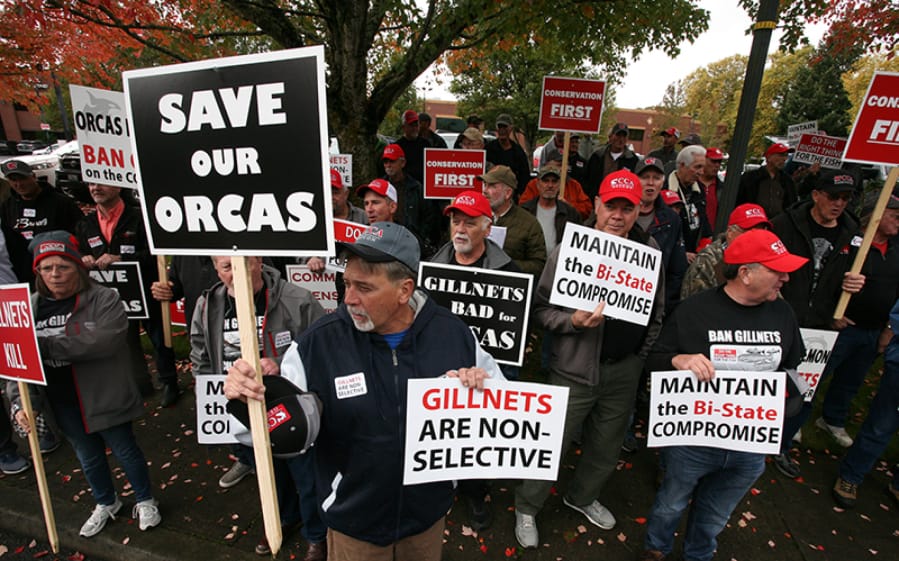The Washington Fish and Wildlife Commission held a series of meetings at the Heathman Lodge in Vancouver from Thursday through Saturday to receive a report from state staff on the Columbia River Basin Salmon Management Policy C-3620, and review the results of that policy.
During the Thursday meeting the WDWC was joined by the Oregon Fish and Wildlife Commission.
While the commissions heard the report and reviewed possible options for the future of the policy, members of the Coastal Conservation Association (CCA) gathered outside the lodge to protest the prospect of the commission’s abandoning the policy entirely, which is one option being considered.
The policy was implemented in an effort to remove non-tribal gill nets used by the commercial fishing fleets of both states from the mainstem Columbia River. The policy was sought by sport anglers and conservationists who have long objected to commercial fishing on salmon and steelhead stocks that are federally endangered.
Gill nets are non-discriminatory in that they ensnare both wild and hatchery salmon.
The stated purpose of Policy C-3620 was to “Promote orderly fisheries, advance the conservation and recovery of wild salmon and steelhead, and to maintain or enhance the economic well-being and stability of the fishing industry in the state.”
The states admit that many of the goals of the policy have not been met. For this reason, commercial fishing interests want the policy ended. Sport anglers and conservationists believe that the failures are the result of a lack of effort by the states, and the policy should be maintained.
The policy was adopted in 2013, amended in 2017, and is slated to run through 2023. It was enacted to deter a citizen’s initiative, Ballot Measure 81, offered in 2012 by the CCA that would have forced the fleet off the main stem by popular vote.
The debate has pitted the commercial fleet against recreational anglers and wild fish advocates in what can best be described as an on-going feud over the use of gill nets on the mainstem Columbia.
The main tenants of the policy included the moving of the gill net fleet off the main channel, a buy-back provision to reduce the size of the commercial fleet, an exploration of possible alternative gears to replace gill nets, and an increase in hatchery production to enhance the off-channel SAFE commercial fisheries.
As part of the policy, anglers fishing the Columbia and its tributaries have been paying the Columbia River Endorsement, which is a yearly fee collected to help fund the policy objectives. Anglers must also use barbless hooks on the Columbia and many tributaries.
In the report, Washington Department of Fish and Wildlife staff admit there is no scientific evidence that barbless hooks reduce mortality.
Sport anglers fear that these extra regulations enacted as part of the policy will remain in place even if the policy itself is rescinded.
In a review prepared by WDFW and Oregon staff, the commissioners learned that many tenants of the policy were considered failures, including the buy-back program, the establishing of new SAFE area fisheries off-channel, and the implementation of alternative gears.
Outspoken criticism
Most commercial fishermen were opposed to the new gears, and said so when public comments were taken during the meetings.
Jim Wells is an active member of the commercial fishing fleet, and he does not sugar-coat his comments about the policy.
“The policy did not work,” said Wells. “Now the two states are going to have to get together and embrace some adaptive management.”
Was he in favor of a buy-back program?
“There is no money for a buy back. The states are having to cut their funding for fish and wildlife. They spent millions on testing alternative gears, and handing out grants (to test the traps). That money could have been used for a buy back,” he added.
Wells said there will be a plan submitted to the commission soon from the commercial interests that he said will be “fair for everyone.”
During the Thursday joint meeting, about 100 members of the CCA staged the protest to show support for the continuation of the policy. Sport anglers feel the states did not pursue the objectives in good faith.
Nello Picinich, the executive director of CCA Washington, spoke about why the protesting anglers were there.
“We wanted to reinforce the importance of moving forward with the bi-state Columbia reforms that were adopted 6 years ago,” he said. “We want to let the commissioners know that there are tens of thousands, or hundreds of thousands of recreational anglers that support following through with the promises that were made.”
Anglers also decry adding nets to the Columbia when the salmon runs are so poor that fishing closures have been enacted across the Northwest.
Washington State Senator Lynda Wilson, R-17, attended the protest as a sign of support, and sent an open letter to the WFWC asking them to continue the policy.
“It has come to my attention that recreational anglers feel like WDFW is actively stonewalling progress on this issue, which demonstrates that WDFW’s pursuit of this goal was far from aggressive,” she wrote.
Other issues were addressed in the meetings, such as the concurrency of the laws between the states, and steelhead cold water refugia.
For a list of suggestions presented to the commission about the future of the policy, read the summary report at:
https://wdfw.wa.gov/commission/meetings/2018/11/nov0118_02_executive_summary.pdf




